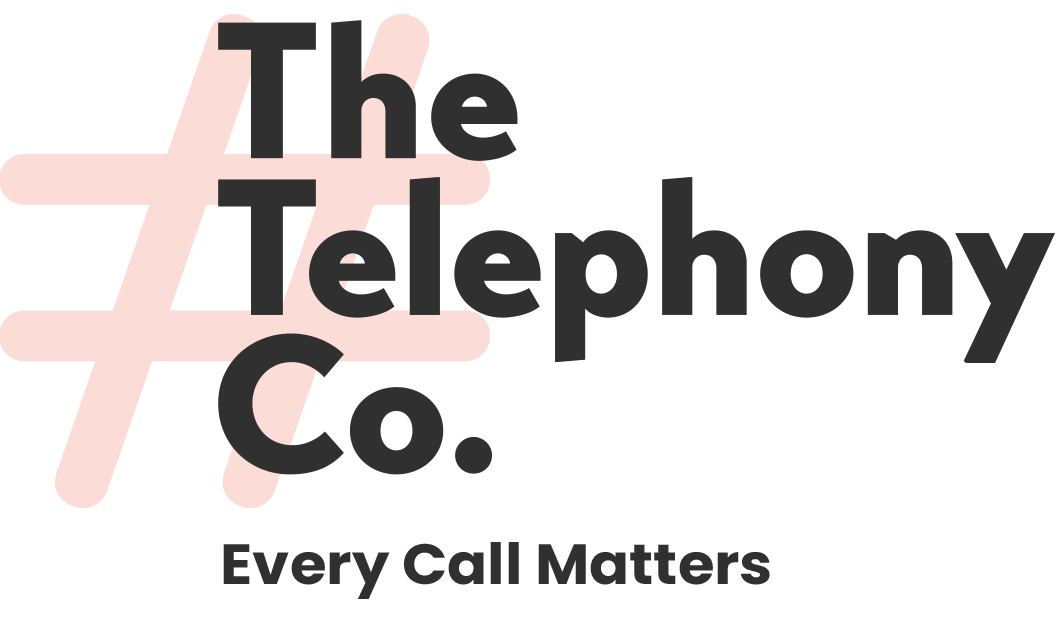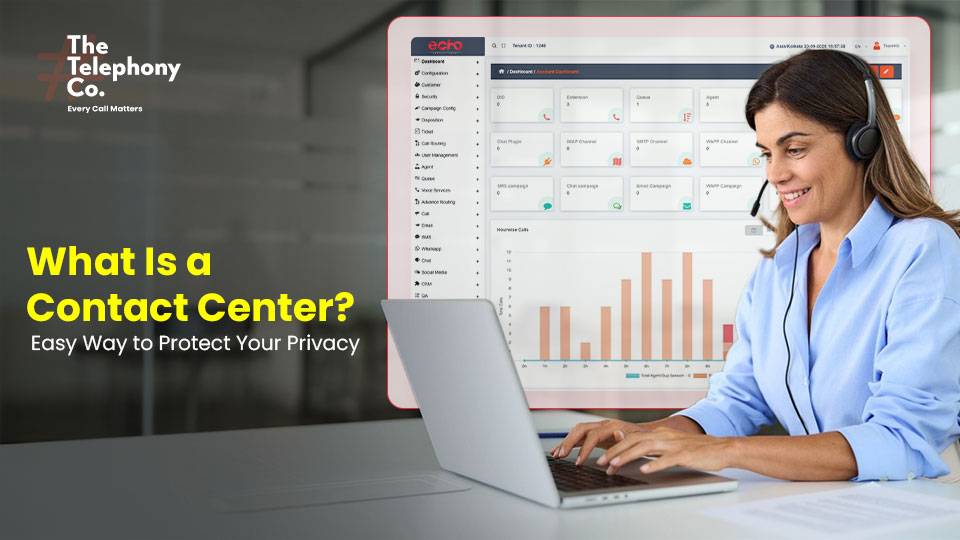Customer experience is the single biggest differentiator in modern business. The companies that win are those that answer faster, personalize interactions, and resolve issues with minimal friction. At the center of this transformation sits the contact center — a unified system for managing customer conversations across voice, chat, email, SMS, WhatsApp, and social channels.
Today, the market is moving fast toward cloud contact centers and AI-powered cloud solutions. These modern platforms help businesses scale quickly, reduce costs, and get smarter about customer conversations. In this article, we’ll explain what a contact center is, walk through the different types, highlight essential features and benefits, and show real-world use cases — all while demonstrating how Echo Contact Center from The Telephony Co. delivers an enterprise-grade, AI-first cloud solution.
What is a Contact Center - Definition and How it Differs from a Call Center
A contact center is a centralized platform that manages customer interactions across multiple channels — voice, email, chat, SMS, social media, and messaging apps like WhatsApp. Unlike a traditional call center, which deals primarily with voice calls, a contact center unifies all channels and provides tools for analytics, routing, CRM integration, and automation.
Key objectives of a contact center:
-
Route customers to the right agent or automation quickly
-
Maintain context across channels (conversation history, customer profile)
-
Measure and optimize performance with real-time dashboards and analytics
-
Automate routine tasks with AI (chatbots, IVR automation, suggested responses)
Experience Smart Communication with Echo CC
Connect Faster
Work Smarter
Engage Better
Experience Smart Communication with Echo CC
Connect Faster
Work Smarter
Engage Better
Types of Contact Centers Software

Inbound Contact Center
An inbound contact center handles incoming customer calls and messages related to inquiries, complaints, and support. Its goal is to resolve issues efficiently, improve satisfaction, and maintain long-term customer relationships through responsive and professional communication. It often uses call-routing systems and automated tools to enhance efficiency.
Outbound Contact Center
An outbound contact center focuses on making calls to customers for sales, promotions, surveys, or feedback collection. It is mainly used for marketing campaigns, lead generation, and business outreach. Agents actively connect with prospects to increase sales opportunities, promote services, and maintain customer engagement effectively.
Multichannel Contact Center
A multichannel contact center allows customers to communicate through different platforms such as phone, email, chat, and SMS. Each channel functions independently, providing multiple options for customer interaction. Although effective for reach, it may lack seamless data integration across channels, which can affect customer experience consistency.
Omnichannel Contact Center
An omnichannel contact center integrates all communication channels into a single system. It provides a unified customer experience where interactions across voice, chat, email, or social media remain connected. This ensures personalized, consistent, and efficient communication, helping businesses build stronger relationships and increase customer satisfaction.
On-Premise Contact Center
An on-premise contact center operates within a company’s own infrastructure, where all hardware, software, and data storage are managed internally. It provides strong control, security, and customization options. However, it requires significant investment in equipment, maintenance, and IT support, making it suitable for large enterprises.
Blended Contact Center
A blended contact center combines both inbound and outbound operations in one system. Agents handle incoming support calls and also make outgoing calls for promotions or follow-ups. This model improves efficiency, resource utilization, and agent productivity while ensuring smooth communication across all customer touchpoints.
 Also Read: Omnichannel Contact Center Solution
Also Read: Omnichannel Contact Center Solution
Core Features Every Modern Cloud Contact Center Should Have
If you’re evaluating platforms, make sure they include these features:
Omni-channel support
Voice, email, chat, SMS, WhatsApp, and social media — all handled from a unified agent interface so context is preserved across the journey.
Intelligent routing & ACD (Automatic Call Distribution)
Route interactions by skill, priority, customer value, channel, or real-time agent availability to reduce wait times and improve outcomes.
Smart IVR & Natural Language IVR
Allow customers to speak naturally and be routed or served automatically using speech recognition and intent detection.
AI-powered automation
Chatbots, virtual assistants, auto-resolve flows, suggested replies for agents, auto-dispositioning, and predictive dialing for outbound campaigns.
Real-time analytics & dashboards
Live monitoring of queues, agent states, SLA breaches, and historical reporting to drive continuous improvements.
CRM & third-party integrations
Native connectors or APIs to Salesforce, Zendesk, Zoho, Freshdesk, and other CRMs so your contact center functions within your existing workflows.
Call recording & speech-to-text (transcription)
Automatic transcripts for compliance, QA, coaching, and post-call analytics.
Security & compliance
Encryption in transit and at rest, role-based access control, and compliance with GDPR, HIPAA (where applicable), and other regulatory standards.
Scalability & global reach
Ability to support remote agents, multi-region capacity, global numbers (DIDs), and elastic scaling as demand changes.
Quality Assurance & Workforce Optimization
Built-in QA, evaluation forms, coaching tools, and workforce planning.
Benefits of Moving to a Cloud Contact Center
Lower total cost of ownership
Cloud models reduce CapEx and shift to operational expense (pay-as-you-grow), eliminating costly hardware upgrades and maintenance overhead.
Speed of deployment
Spin up queues, campaigns, and agents in hours, not months. Rapid rollout means faster ROI.
Support for remote and hybrid workforces
Cloud systems enable agents to log in from anywhere with secure access and consistent tools.
Better customer experience
Omni-channel context and AI-driven assistance reduce repeats and increase first-call (or first-contact) resolution.
Data-driven decisions
Rich analytics help you optimize staffing, identify friction points in the customer journey, and measure business outcomes.
Future-proofing with AI
AI reduces routine tasks, surfaces insights at scale, and enables self-service without sacrificing CX quality.
Start Free Trial — “Experience Echo Contact Center free for 14 days and see how AI improves your first-contact resolution.”
 Also Read: Best Contact Center Software Providers
Also Read: Best Contact Center Software Providers
Echo Contact Center — Why it Stands Out
Echo Contact Center by The Telephony Co. is an AI-powered, cloud-based contact center platform built for modern teams that need powerful automation, simple administration, and enterprise-class security.
Key Echo features you can use for marketing and sales conversion:
-
Omnichannel Dashboard: Single-pane-of-glass agent UI for voice, chat, email, SMS, WhatsApp, and social.
-
AI Assistant: Automatic call summaries, sentiment scoring, and agent assist (real-time suggested responses).
-
Smart Routing & IVR: Context-aware routing that leverages customer profile and intent.
-
Predictive Dialer & Outbound Campaigns: Improve agent productivity and connect rates.
-
Deep CRM Integrations: Plug-and-play connectors with Salesforce, Zendesk, Zoho, and more.
-
Enterprise Security: End-to-end encryption, role-based access, and compliance support.
-
Scalable Cloud Architecture: Multi-region support, elastic scaling, and global DIDs.
-
Built for Growth: Modular pricing, white-labeling, and APIs for custom workflows.
Why market Echo: position it as a cost-saving, AI-first contact center that helps teams scale without hiring a linearly larger workforce — ideal for businesses moving to cloud-based CX.
Book a Demo — “Schedule a 20-minute demo to see Echo live and get a tailored ROI projection.”
Real-World Use Cases
1. Customer Support & Helpdesk
Problem: High call volumes, long wait times, inconsistent answers.
Echo Solution: AI triage and intent detection route to the right agent or knowledge-base article, while chatbots resolve repetitive queries. Result: faster resolution, lower AHT (average handle time), better NPS.
2. Sales & Outbound Campaigns
Problem: Low connect rates and poor lead prioritization.
Echo Solution: Predictive dialing, lead scoring, and integrated CRM workflows boost connect rates and close more deals.
3. E-commerce & Retail
Problem: High seasonal spikes and returns queries.
Echo Solution: Omni-channel support (chat + WhatsApp) and bots for order tracking reduce live agent load while maintaining conversion rates.
4. Healthcare & Appointments
Problem: Sensitive data and strict compliance.
Echo Solution: Secure channels, encrypted recording, and automated appointment reminders via voice and SMS.
5. Financial Services & Compliance-heavy Environments
Problem: Audit trails and strict regulation.
Echo Solution: Full call recording, transcripts, role-based access, and reporting to meet regulatory requirements.
How to Evaluate and Pick a Cloud Contact Center Vendor
- Map business outcomes: cost savings, FCR improvements, CSAT targets.
- Test omni channel flows: ensure agent UI supports blended interactions.
- Check AI capabilities: agent assist, speech-to-text accuracy, and chatbot integration.
- Integration readiness: CRM, ticketing, and workforce tools.
- Security & compliance: encryption, data residency options, and certifications.
- TCO & pricing model: predictable per-agent pricing with transparent add-ons.
- Support & onboarding: implementation timeline and training resources.
Echo checks these boxes — and The Telephony Co. offers migration support and white-glove onboarding for enterprise customers.
Migration Checklist — Moving from Legacy to Echo Contact Center
- Inventory current channels, call volumes, and integrations.
- Define success metrics (AHT, FCR, CSAT, cost per contact).
- Pilot with a representative queue and migrate agents in waves.
- Train agents on the Echo UI and AI assist features.
- Monitor performance and iterate using Echo dashboards.
Request Pricing — “Need enterprise pricing and custom SLAs? Request a quote and we’ll respond within one business day.”
Ready to Transform your CX?
Start Your 14 Days Free Trial No Credit Card Needed
Final Thoughts — The Future is Cloud + AI
Legacy call centers handled voice. Modern businesses need omni channel, context-driven, AI-enabled contact centers that improve customer experience while reducing operational cost. Echo Contact Center — built by The Telephony Co.— delivers that future today: secure, scalable, and smart.
Frequently Asked Questions
What is the difference between a cloud contact center and a cloud-based contact center?
They’re effectively the same — both terms describe a contact center hosted in the cloud rather than on-premises, providing scalability, faster deployment, and remote agent access.
Is Echo Contact Center suitable for small businesses?
Yes. Echo supports modular pricing and can scale from small teams to enterprise deployments, offering features that small businesses need (IVR, chatbots, CRM integration) without heavy upfront costs.
How does AI improve contact center performance?
AI automates routine tasks (chatbots, IVR), suggests replies to agents, summarizes conversations, scores sentiment, and helps route customers more intelligently — reducing handle times and boosting CSAT.
How long does it take to deploy Echo?
Typical deployment can range from a few days (for standard setups) to a few weeks (for full enterprise integrations and customizations). The Telephony Co. provides guided onboarding to accelerate time-to-value.
Can Echo Contact Center integrate with Salesforce or Zendesk?
Yes. Echo has native connectors and APIs for Salesforce, Zendesk, Zoho, Freshdesk, and major CRMs, enabling bi-directional data flow and seamless agent workflows.

